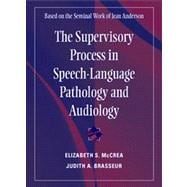
Forward by Jean L. Anderson, Ed.D.
Preface.
Acknowledgements.
1. Introduction.
Describing Supervision and Supervisors.
Settings for Supervision.
Complexities of the Supervisory Process.
Characteristics of Supervisors.
Purposes of Supervision.
A Definition for Speech-Language Pathology or Audiology.
2. Anderson's Continuum Model of Supervision.
Development of Supervisory Behaviors.
Supervisory Approaches in Speech-Language Pathology and Audiology.
The Continuum of Supervision in Speech-Language Pathology and Audiology.
Appendix 2: Samples of a Direct, Direct/Indirect and Indirect Supervisory Conference.
3. Components of the Supervisory Process.
Component I: Understanding the Supervisory Process.
Component II: Planning.
Component III: Observing.
Component IV: Analyzing.
Component V: Integrating.
Practical Research in Supervision.
Appendix 3: A ASHA Position Statement on Clinical Supervision.
4. Understanding the Supervisory Process.
Purpose of the Component.
Treatment of the Supervisory Process in Conferences.
Understanding Roles in the Supervisory Process.
Expectations for Supervision.
Anxiety in the Supervisory Process.
Implications for Participants in the Supervisory Process.
Preparing for Supervision.
Teaching Supervisees about the Supervisory Process.
Appendix 4-A: Larson's Expectations Scale.
Appendix 4-B: Larson's Needs Scale.
Appendix 4-C: Tihen's Expectations Scale.
Appendix 4-D: Broyle's et al Supervision Surveys.
Appendix 4-E: Powell's Attitudes Toward Clinical Supervision Scale.
Appendix 4-F: Supervisory Conference Rating Scale.
Appendix 4-G: Casey's Supervisory Skills Self-Assessment.
5. Planning the Supervisory Process.
Assessment of Supervisees.
Implementing the Planning Component.
Planning the Supervisory Process.
Realities of Planning.
Appendix 5-A: Wisconsin Procedure for Appraisal of Clinical.
Competence (W-PACC).
Appendix 5-B: Indiana University Evaluation of Practicum.
Appendix 5-C: Bartlett's Supervisory Action Plan.
6. Observing the Supervisory Process.
Purposes of Observation.
Characteristics of Observation.
Importance of Observation.
Planning the Observation.
Strategies for Observation.
Development of Observational Techniques.
Analysis Systems in Speech-Language Pathology and Audiology.
Where Have All the Systems Gone?
Appendix 6-A: Kansas Inventory of Self-Supervision (KISS).
Appendix 6-B: Boone and Prescott Interaction Analysis System.
Appendix 6-C: Analysis of Behavior of Clinicians (ABC).
Interaction Analysis System.
7. Analyzing the Supervisory Process.
Scientific Aspects of Analysis.
Importance of Analysis.
Purposes of Analysis in Supervision.
Methods of Analysis.
Determining the Content of the Supervisory Conference.
Evaluation.
Appendix 7-A: Formative Evaluation Tool.
8. Integrating the Components.
Scheduled Conferences.
Communication in the Conference.
Skills for Facilitating Communication in the Conference.
Interpersonal Aspects of the Conference.
Planning For the Conference.
Feedback.
Conferences.
What's a Supervisor To Do?
9. Preparation for the Supervisory Process.
Preparation in Speech—Language Pathology and Audiology.
Models for Preparation in the Supervisory Process.
Implications of Adult Learning Styles.
Need For Research on Preparation of Supervisors.
Outcomes of the Supervisory Process.
Use of Interaction Analysis Systems.
Appendix 9-A: Underwood System for Analyzing Supervisor-Clinician Behavior.
Appendix 9-B: Culatta and Seltzer Interaction Analysis System.
Appendix 9-C: McCrea's Adapted Scales for Assessment of Interpersonal Functioning.
Appendix 9-D: Smith's Adapted MOSAICS.
10. Accountability.
Accountability Systems within the Professions.
Accountability Systems External to the Professions.
Supervisor Accountability.
Leadership-Administration-Management.
11. Supervision Across Settings.
Supervision in the Service Delivery Setting.
Supervision in Off-Campus Practicum.
Supervision of the Clinical Fellowship Year.
12. The Supervision of Speech-Language Pathology Assistants.
Background.
Scope of Responsibility.
Utilization and Training of Speech-Language Pathology Assistants.
Supervision of Speech-Language Pathology Assistants.
Knowledge and Skill for Supervisors of Speech-Language Assistants.
Preparation for the Supervisory Process.
Accountability.
Appendix 12-A: ASHA Knowledge and Skills Document.
Appendix 12-B: ASHA's Practical Tools and Forms.
For Supervising Speech-Language Pathology Assistants.
Case Problems.
References.
Subject Index.
Author Index.
The New copy of this book will include any supplemental materials advertised. Please check the title of the book to determine if it should include any access cards, study guides, lab manuals, CDs, etc.
The Used, Rental and eBook copies of this book are not guaranteed to include any supplemental materials. Typically, only the book itself is included. This is true even if the title states it includes any access cards, study guides, lab manuals, CDs, etc.